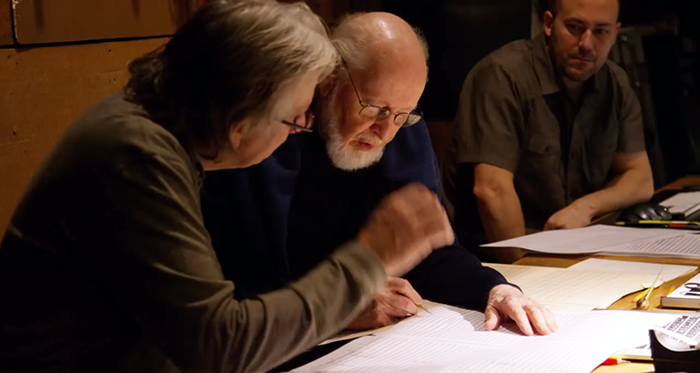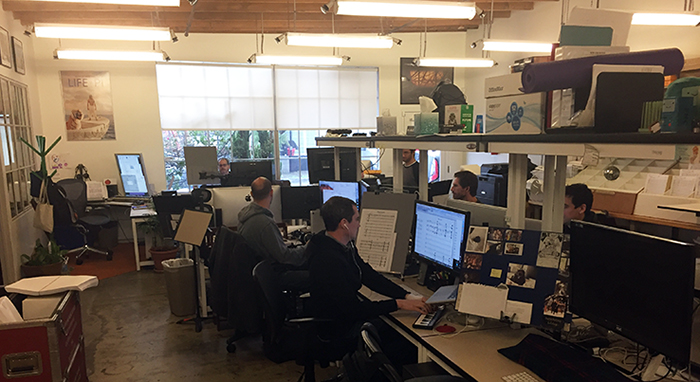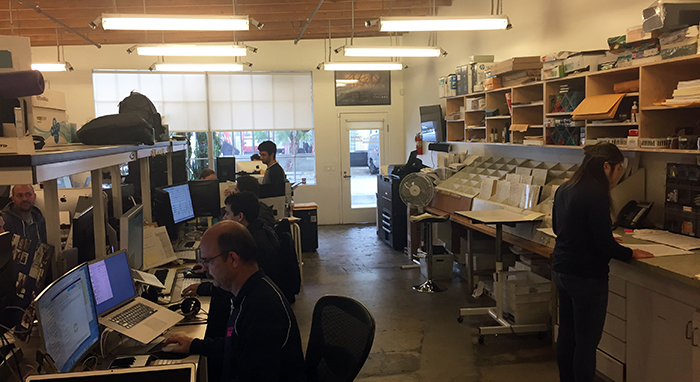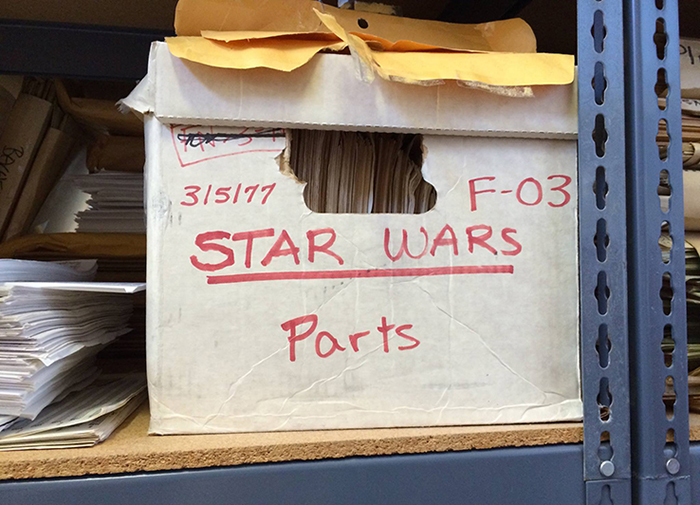
In celebration of May the Fourth day, I spoke to Mark Graham, owner of Joann Kane Music. Those of you who watch movie credits will recognize his company’s name as they are frequently listed as “Music Preparation” in top films, including many Star Wars classics.
Mark (pictured above at left, with John Williams and Victor Pesavento) was kind enough to speak to us about their work on these films in honor of the day.
What Star Wars films have you been involved with?
I worked on the three prequels, Episode VII, and we’re just finishing up on Episode VIII now.
Can you describe your workflow on these films?
John William writes very detailed handwritten sketches. On the prequels, these sketches went to orchestrators. The orchestrators would write pencil scores and we would copy parts into Finale.
But for the past six or seven years, John has just sent the sketches directly to us. We put them straight into Finale. I’ve kind of edited them, checked them out myself, and then we’ve used them at the stage for recording.
Is there much in the way of back and forth or does he trust that you know what he wants?
Well, I would say it’s a relationship based on twenty years of pretty much full-time activity and a lot of trust. He’s very careful with the way he writes his sketches. Obviously, when we input them into Finale scores, we’re very respectful of that. He uses several forms of shorthand, but we’re accustomed to the way that works, and know what to look for.
The only thing I would say that we sometimes have to deal with is the woodwinds, in term of assigning particular instruments. Often I have to make a decision on instruments to cue in case he might want more sound in a particular place.
We’ve got it down to a well-established practice now because we’ve been doing it for so long. I’ve been at all of the recording sessions since 1998, so I have a very good sense of how he works as I’m always there. Once he sends the sketches to us, it’s only very rarely that he’ll want to look at the score.

So the first time he sees the score is at the recording session?
Typically, John will work from his sketches and look at the score every now and then if there’s an issue we need to work out, in terms of balance or something like that. For this reason, I’m very near the podium during the sessions, and I have a set of his sketches and a set of the scores we’ve prepared that the engineer uses to mix with.
Can you share a sense of what it feels like at the sessions? Is it tense?
No, it absolutely is not tense. Many recording sessions can be very tense and tempers can get frayed and there can be an atmosphere sometimes, but his sessions, I would say that they’re very business-like. He can lighten things up with humor, but he can be very demanding on an orchestra as he has very high standards. He’s got a vast amount of experience and he doesn’t waste any time.
He’s always prepared. We start right at ten o’clock. There’s no speeches or chat or “Is this ready?” or “Is that ready?” The musicians know exactly the order of the cues we’re going to play that particular day. We typically post difficult music online for them to look at ahead of time if we can, so they have a sense of that. The principal string players will have a sense of how it’s going to be bowed and all the rest of it, and then we move on really quickly.
We can typically record comfortably over twenty minutes in a day, which is a lot for epic film scores like these, and we’ll be done without overtime. But that’s because he’s so efficient and everything is well prepared and thought out.
Can you share a story of a time when things didn’t go exactly as planned?
I can remember one incident on a “Harry Potter” film. There was a short cue he’d written for a kind of unusual small band and there were no strings. There might have been an accordion or a keyboard or something like that.
So I got a call to go out to the podium. And he said to me, sotto voce, “There are no strings on this cue.” We looked at it together and I said, “Well, you didn’t write any strings.” And he said, “Well, you know what to do.” [Laughs]
So I provided the string parts from his keyboard sketch and within forty-five minutes or an hour they had strings and that’s the way we did that.
Again, there’s that level of trust.
Definitely a level of trust, yeah. None of this would work with any of these composers without some level of trust, frankly.

Do you ever see clues in the music that reveal upcoming plot twists?
Yes – often. And the people here are very sensitive to that. We’ve got to be careful. There can be a big reveal either with some text in the cue or with thematic material which indicates the appearance or disappearance of a character.
As a fan, I think it would be tough if you were working on the project and had a reveal like that.
Yes. People here are interested. I can remember at the end of one of the prequel movies, we were saying goodbye to George Lucas and my colleague at the stage asked him about one of the characters. And George was very surprised to get this question – I would say taken aback – and said, “Well, how did you know about that?” And my colleague explained his thought process on this character.
George listened to this and then gave a big explanation of how this character was going to be very present in the next movie. And it was quite interesting to hear that whole thought process, which was all worked out, and of course, we hadn’t seen any of it yet because they hadn’t even shot the film. But obviously, it was coming. And my colleague had worked it out in advance and then a couple of years later, we saw all the evidence of that in the film.
“The Force Awakens” was recorded in the U.S., right?
Yes, and Episode VIII was also recorded in the U.S.
The three prequel films, Episodes I, II, and III, and were all done with the LSO at Abbey Road. I think IV and V were done at Denham, an old film studio in London, but that’s before my time.
Interesting enough, we’re recreating those first scores right now for some concerts with the New York Philharmonic in September. We’re going to do the first three films and “The Force Awakens” in concert over a period of about two weeks, with two shows for each film or something like that. And that’s been a very interesting project to put together.
Can you say anything about the difference in working on Star Wars music with an American orchestra in a different studio?
The LSO is a leading, well-established, top symphony orchestra. They play together all the time and they have a definite kind of overall sound and Abbey Road also has got its own unique sound. We’re working with a studio orchestra in L.A. which is a fine orchestra, at Sony, one of the L.A. scoring stages in Culver City. It’s a big room that can absorb a lot of sound. And so there’s a denser kind of feel to the sound the orchestra makes than at Abbey Road – it’s not quite as bright. It’s a slightly different experience.
When we did the prequel films, we would just do five or six days in a row and then go home.
The way that John works now, we’ll do a day or two in a week and then have a couple of weeks off. It’s a much more leisurely pace partly due to the writing schedule and a myriad of other factors, but it works very well. The filmmakers can get a sense of what they like in certain sections of the movie, which informs all of us as we move forward and can save quite a bit of back and forth.
So it’s a different experience from that point of view, but basically, the orchestra has been the same kind of players, the same people. And they played very well. They’ve really kind of risen to the challenge of this music, which is difficult.
Are efforts made to make it sound like the earlier recordings?
No. They want to make this music that he’s written now as good as it can be. I mean, that’s the whole thing. Mr. Williams is not a person to kind of rest on his laurels. He’ll want to constantly improve both in terms of performances and what he thinks he can do in terms of writing thematic material slightly differently, orchestrating slightly differently, working on the performances just to really fine tune stuff.
To close, is there something that I haven’t asked about that I should have?
I don’t know – people get very excited about Star Wars material. When you hear some of these beautiful themes played, 30 or 40 years later, with these musicians here in L.A., I think there’s a big feeling of… I don’t want to say reverence exactly, but certainly a massive feeling of respect toward that music and towards making it sound really good. It’s become a cultural icon like it or not, and I think people really want to be a part of that, and really want to do well in their contribution
This includes the engineers, stage crew, the musicians and all of the people at my office. We work really hard on this stuff. And the production team as well – the people who mix it and everything, they really want to make it great. They know a lot of people are going to listen to it for a long time.
Many of the people are working on music that’s been part of their lives for most of their lives.
Oh, no doubt. It’s remarkable.
Sometimes I see footage and I try to imagine it without this particular music. Obviously, it could be done with a different approach, but John’s music has been the language of these films and is a very big part of it.
Thank you for your time today.
My pleasure. I’m not a person who gives a lot of interviews, but I understand that this is interesting to people. And Finale, using your software has been a big part of this. All the Star Wars films we’ve done have been prepared with it and it’s very handy to do this stuff digitally and to have very clear and accurate parts on the music stands. Finale has been a great tool for that. You can talk yourselves up a bit for that – It has been a good thing for us to use it.
People might not immediately understand that in the early films the performers were actually reading from handwritten parts.
Oh, yeah. We’ve got some handwritten material from the very first film. And when we look at how we’re doing that material now, it’s very nice and clear for people to read from. Put it like that.

Thanks again to Mark for taking the time to talk to us and to everyone at Joann Kane for the part they’ve played in so many of our favorite films!